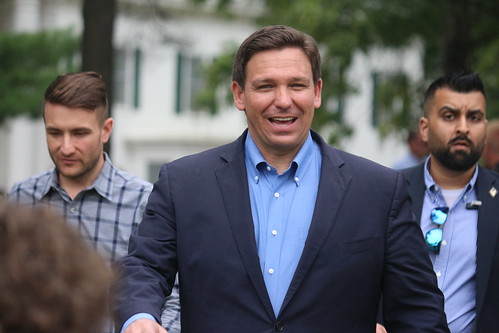Ron DeSantis Flailed When Fox News Asked Why So Many Floridians Are Uninsured
DeSantis #DeSantis

Florida Gov. Ron DeSantis speaks Wednesday during the Republican presidential primary debate hosted by Fox Business Network and Univision at the Ronald Reagan Presidential Library in Simi Valley, California.
There was a genuine milestone in Wednesday night’s Republican presidential debate: Somebody finally asked Florida Gov. Ron DeSantis why so many of his state’s residents have no health insurance.
He didn’t have much of an answer ― which in some ways is pretty surprising and in some other ways isn’t surprising at all.
It’s surprising because the subject of health insurance in Florida has gotten plenty of attention in the press, both in the state and outside of it. That includes severalarticles here at HuffPost.
More than 11% of the state’s residents have no health insurance, according to the latest U.S. Census Bureau estimates. Only in Georgia, Texas and Wyoming is a higher percentage of the population uninsured.
And there’s no great mystery why. Florida (like those other three) is among 10 holdout states that have refused to participate in the Affordable Care Act’s expansion of Medicaid, which would have made it available to everybody living below or just above the poverty line.
Instead, Florida still has older, much stingier criteria that limit it primarily to children and pregnant women. Adults with minor children can also qualify but only if their income is less than 25% of the poverty line ― which, for a family of three, is barely more than $6,000 a year.
Advocates have long begged the Republicans in charge of Florida to drop their opposition to Medicaid expansion, which is rooted in in their antipathy toward the “welfare state” generally and Obamacare specifically. DeSantis, like his predecessor and other state GOP leaders, has refused.
That prompted Wednesday night’s question, which came from Fox News host Stuart Varney.
“Gov. DeSantis, 26 million Americans don’t have insurance coverage,” Varney said. “Two and a half million of them are in your state. That’s worse than the national average. Can Americans trust you on this?”
DeSantis should be plenty familiar with the subject, and not simply because it came up in his gubernatorial campaigns. As a U.S. House member in 2017, he had a chance to vote on repeal of the Affordable Care Act. He supported the repeal wholeheartedly, to the point that he actually voted against an early version because ― like some other more conservative Republicans ― he thought it didn’t go far enough in undoing the law’s regulations.
But on the debate stage Wednesday night, instead of explaining his position on Medicaid expansion or health care policy, DeSantis launched into a rambling argument about how inflation was driving up the cost of groceries and gas before finally offering a boilerplate line about attacking “Big Pharma, big insurance and big government” in order to have “more power for the people and the doctor-patient relationship.”
Varney, to his credit, tried one more time, asking, “Why is your record in Florida on insurance worse than the national average?”
But once again DeSantis said nothing about Medicaid or insurance, instead touting Florida as a “dynamic state.”
“You can do well in the state, but we’re not going to be like California and have massive numbers of people on government programs without work requirements,” DeSantis responded. “We believe you work, and you’ve got to do that. And so that goes for all the welfare benefits.”
That part of the answer at least offered a clear window into DeSantis’ core beliefs, which he’s laid out before, including in his books. It also glossed over some key facts ― among them, findings that 7 in 10 non-elderly adults on Medicaid are in a family with at least one worker.
The reason they don’t have health insurance isn’t that they can’t find a job. It’s that the jobs “do not have an offer of employer-sponsored coverage, or it is not affordable,” according to an explainer from the nonpartisan health research organization KFF.
Of course, it’s not like DeSantis is the first Republican to struggle defending a conservative position on health care. It’s been a particular problem ever since 2017, when the GOP push to repeal Obamacare provoked a massive backlash ― and played a key role in helping Democrats take back the U.S. House that year.
Medicaid expansion and other Democratic health care policies have turned out to be very popular, and Republican attacks on them have turned out to be very unpopular. So while it’s a mystery why DeSantis and his staff hadn’t prepared a better answer to such a predictable question, even a slicker answer would have left him defending policies that the public doesn’t seem to like.
Related…